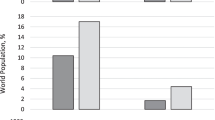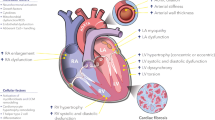Abstract
Latest European Societies of Hypertension and Cardiology (ESH/ESC) have acknowledged that brain represent a relevant target for hypertension mediated organ damage (HMOD). In fact, brain damage can be the only HMOD in more than 30% of hypertensive subjects, evolving undetected for several years if not appropriately screened. However, no clear position has been indicated on how to evaluate brain HMOD. The present manuscript would contribute to briefly summarize structural and functional brain HMOD for the medical community dealing with older hypertensive patients. Arterial aging is proposed as possible “common soil” underlying structural and functional brain HMOD. Finally, a simple algothythm to screen older hypertensive subjects for cognitive function is proposed and discussed.

Similar content being viewed by others
References
Williams B, Mancia G, Spiering W, AgabitiRosei E, Azizi M, Burnier M, et al. 2018 ESC/ESH Guidelines for the management of arterial hypertension: The Task Force for the management of arterial hypertension of the European Society of Cardiology and the European Society of Hypertension: the Task Force for the management of arterial hypertension of the European Society of Cardiology and the European Society of Hypertension. J Hypertens. 2018;36:1953–2041. https://doi.org/10.1097/HJH.0000000000001940.
Scuteri A, Najjar SS, Orru’ M, Albai G, Strai J, Tarasov KV, Piras MG, Cao A, Schlessinger D, Uda M, Lakatta EG. Age- and gender-specific awareness, treatment, and control of cardiovascular risk factors and subclinical vascular lesions in a founder population: the SardiNIA Study. Nutr Metab Cardiovasc Dis. 2009;19:532–4. https://doi.org/10.1016/j.numecd.2008.11.004.
Lackland DT, Roccella EJ, Deutsch AF, Fornage M, George MG, Howard G, et al. On behalf of the American Heart Association Stroke Council; Council on Cardiovascular and Stroke Nursing; Council on Quality of Care and Outcomes Research; Council on Functional Genomics and Translational Biology. Factors influencing the decline in stroke mortality: a statement from the American Heart Association/American Stroke Association. Stroke. 2014;45:315–53. https://doi.org/10.1161/01.str.0000437068.30550.cf.
Forman DE, Rich MW, Alexander KP, Zieman S, Maurer MS, Najjar SS, et al. Cardiac care for older adults. Time for a new paradigm. J Am Coll Cardiol. 2011;57:1801–10. https://doi.org/10.1016/j.jacc.2011.02.014.
Nilsson PN, Laurent S, Cunha PG, Olsen MH, Rietzschel E, Franco OH, Ryliskyte L, Strazhesko I, Vlachopoulos C, Chen CHM, Boutouyrie P, Cucca F, Lakatta EG, Scuteri A. Characteristics of Healthy Vascular Ageing (HVA) in pooled population-based cohort studies: the global MARE consortium. J Hypertens. 2018;36:2340–9. https://doi.org/10.1097/HJH.0000000000002246.
Collaborators GBDD. Global, regional, and national burden of Alzheimer’s disease and other dementias, 1990–2016: a systematic analysis for the Global Burden of Disease Study 2016. Lancet Neurol. 2019;18:88–106. https://doi.org/10.1016/S1474-4422(18)30403-4.
- MetLife Foundation. What America thinks: MetLife Foundation Alzheimer’s survey. MetLife website. https://www.metlife.com/content/dam/microsites/about/corporate-profile/alzheimers-2011.pdf.
Scuteri A, Benetos A, Sierra C, Coca A, Chicherio C, Frisoni GB, et al. Routine assessment of cognitive function in older patients with hypertension seen by primary care physicians: why and how-a decision-making support from the working group on “hypertension and the brain” of the European Society of Hypertension and from the European Geriatric Medicine Society. J Hypertens. 2021;39:90–100. https://doi.org/10.1097/HJH.0000000000002621.
Sehestedt T, Jeppesen J, Hansen TW, Wachtell K, Ibsen H, Torp-Pedersen C, et al. Risk prediction is improved by adding markers of subclinical organ damage to SCORE. Eur Heart J. 2010;31:883–91. https://doi.org/10.1093/eurheartj/ehp546.
Scuteri A, Lakatta EG. Bringing prevention in geriatrics: evidence from cardiovascular medicine supporting the new challenge. Exp Gerontol. 2013;48:64–8. https://doi.org/10.1016/j.exger.2012.02.009.
Scuteri A. Brain injury as end-organ damage in hypertension. Lancet Neurol. 2012;11:1015–7. https://doi.org/10.1016/S1474-4422(12)70265-X.
Forman DE, Maurer MS, Boyd C, Brindis R, Salive ME, Horne FM, Bell SP, Fulmer T, Reuben DB, Zieman S, Rich MW. Multimorbidity in older adults with cardiovascular disease. J Am Coll Cardiol. 2018;71:2149–61. https://doi.org/10.1016/j.jacc.2018.03.022.
Viggiano D, et al. Mechanisms of cognitive dysfunction in CKD. Nat Rev Nephrol. 2020;16:452–69. https://doi.org/10.1038/s41581-020-0266-9.
Hooghiemstra AM, et al. Frequent cognitive impairment in patients with disorders along the heart-brain axis. Stroke. 2019;50:3369–75. https://doi.org/10.1161/STROKEAHA.119.026031.
Wardlaw JM, Valdés Hernández MC, Muñoz-Maniega S. What are white matter hyperintensities made of? Relevance to vascular cognitive impairment. J Am Heart Assoc. 2015;4: 001140. https://doi.org/10.1161/JAHA.114.001140.
Garde E, Mortensen EL, Krabbe K, Rostrup E, Larsson HB. Relation between age-related decline in intelligence and cerebral white-matter hyperintensities in healthy octogenarians: a longitudinal study. Lancet. 2000;356:628–34. https://doi.org/10.1016/S0140-6736(00)02604-0.
Moroni F, Ammirati E, Rocca MA, Filippi M, Magnoni M, Camici PG. Cardiovascular disease and brain health: focus on white matter hyperintensities. Int J Cardiol Heart Vasc. 2018;19:63–9. https://doi.org/10.1016/j.ijcha.2018.04.006 (eCollection 2018 Jun).
Makin SDJ, Cook FAB, Dennis MS, Wardlaw JM. Cerebral small vessel disease and renal function: systematic review and meta-analysis. Cerebrovasc Dis. 2015;39:39–52. https://doi.org/10.1159/000369777.
Herrmann LL, Le Masurier M, Ebmeier KP. White matter hyperintensities in late life depression: a systematic review. J Neurol Neurosurg Psychiatry. 2008;79:619–24. https://doi.org/10.1136/jnnp.2007.124651.
Shen DC, Wu SL, Shi YZ, Wang S, Zhang YM, Wang CX. The correlation between white matter hyperintensity and balance disorder and fall risk: An observational, prospective cohort study. Chronic Dis Transl Med. 2016;2:173–80. https://doi.org/10.1016/j.cdtm.2016.11.008 (eCollection 2016 Sep).
Callisaya ML, Beare R, Phan T, Blizzard L, Thrift AG, Chen J, Srikanth VK. Progression of white matter hyperintensities of presumed vascular origin increases the risk of falls in older people. J Gerontol A Biol Sci Med Sci. 2015;70:360–6. https://doi.org/10.1093/gerona/glu148.
Debette S, Markus HS. The clinical importance of white matter hyperintensities on brain magnetic resonance imaging: systematic review and meta-analysis. BMJ. 2010;341: c3666. https://doi.org/10.1136/bmj.c3666.
Verdelho A, Madureira S, Moleiro C, Ferro JM, Santos CO, Erkinjuntti T, Pantoni L, Fazekas F, Visser M, Waldemar G, et al. LADIS Study. White matter changes and diabetes predict cognitive decline in the elderly: the LADIS study. Neurology. 2010;75:160–7. https://doi.org/10.1212/WNL.0b013e3181e7ca05.
Debette S, Seshadri S, Beiser A, Au R, Himali JJ, Palumbo C, Wolf PA, DeCarli C. Midlife vascular risk factor exposure accelerates structural brain aging and cognitive decline. Neurology. 2011;77:461–8. https://doi.org/10.1212/WNL.0b013e318227b227.
Scuteri A, Palmieri L, Lo Noce C, Giampaoli S. Age-related changes in brain functions: cognition, executive process, and motor speed. A population-based study. Aging Clin Exp Res. 2005;17:367–73. https://doi.org/10.1007/BF03324624.
Iadecola C, Yaffe K, Biller J, Bratzke LC, Faraci FM, Gorelick PB, et al. Impact of hypertension on cognitive function: a scientific statement from the American heart association. Hypertension. 2016;68(6):e67–94. https://doi.org/10.1161/HYP.0000000000000053.
van Dalen JW, Brayne C, Crane PK, Fratiglioni L, Larson EB, Lobo A, et al. Association of systolic blood pressure with dementia risk and the role of age, U-shaped associations, and mortality. JAMA Intern Med. 2022;182:142–52. https://doi.org/10.1001/jamainternmed.2021.7009.
Hughes D, Judge C, Murphy R, Loughlin E, Costello M, Whiteley W, et al. Association of blood pressure lowering with incident dementia or cognitive impairment: a systematic review and meta-analysis. JAMA. 2020;323:1934–44. https://doi.org/10.1001/jama.2020.4249.
Nasreddine ZS, Phillips NA, Bedirian V, Charbonneau S, Whitehead V, Collin I, et al. The Montreal Cognitive Assessment, MoCA: a brief screening tool for mild cognitive impairment. J Am Geriatr Soc. 2005;53:695–9. https://doi.org/10.1111/j.1532-5415.2005.53221.x.
Folstein MF, Folstein SE, McHugh PR. “Mini-mental state”. A practical method for grading the cognitive state of patients for the clinician. J Psychiatr Res. 1975;12:189–98. https://doi.org/10.1016/0022-3956(75)90026-6.
Samieri C, Perier MC, Gaye B, Proust-Lima C, Helmer C, Dartigues JF, Berr C, Tzourio C, Empana JP. Association of cardiovascular health level in older age with cognitive decline and incident dementia. JAMA. 2018;320(7):657–64. https://doi.org/10.1001/jama.2018.11499.
Najjar SS, Scuteri A, Lakatta EG. Arterial aging: is it an immutable cardiovascular risk factor? Hypertension. 2005;46:454–62. https://doi.org/10.1161/01.HYP.0000177474.06749.98.
Scuteri A, Modestino A, Frattari A, et al. Occurrence of hypotension in older participants. Which 24-hour ABPM parameter better correlate with? J Gerontol A Biol Sci Med Sci. 2012;67:804–10. https://doi.org/10.1093/gerona/glr232.
Scuteri A, Rovella V, AlunniFegatelli D, Tesauro M, Gabriele M, Di Daniele N. An operational definition of SHATS (Systemic Hemodynamic Atherosclerotic Syndrome): role of arterial stiffness and blood pressure variability in elderly hypertensive subjects. Int J Cardiol. 2018;15(263):132–7. https://doi.org/10.1016/j.ijcard.2018.03.117.
Wharton SB, Simpson JE, Brayne C, Ince PG. Age-associated white matter lesions: the MRC cognitive function and ageing study. Brain Pathol. 2015;25:35–43. https://doi.org/10.1111/bpa.12219.
Sharman JE, O’Brien E, Alpert B, Schutte AE, Delles C, Hecht Olsen M, et al. on behalf of the Lancet Commission on Hypertension Group. Lancet commission on hypertension group position statement on the global improvement of accuracy standards for devices that measure blood pressure. J Hypertens. 2020;38:21–9. https://doi.org/10.1097/HJH.0000000000002246.
Lakatta EG, AlunniFegatelli D, Morrell CH, Fiorillo E, Orru M, Delitala A, Marongiu M, Schlessinger D, Cucca F, Scuteri A. Impact of stiffer arteries on the response to antihypertensive treatment: a longitudinal study of the SardiNIA cohort. J Am Med Dir Assoc. 2020;21:720–5. https://doi.org/10.1016/j.jamda.2019.11.014.
Scuteri A, Coluccia R, Castello L, Nevola E, Brancati AM, Volpe M. Left ventricular mass increase is associated with cognitive decline and dementia in the elderly independently of blood pressure. Eur Heart J. 2009;30:1525–9. https://doi.org/10.1093/eurheartj/ehp133.
Antonelli-Incalzi R, Corsonello A, Trojano L, Acanfora D, Spada A, Izzo O, Rengo F. Correlation between cognitive impairment and dependence in hypoxemic COPD. J Clin Exp Neuropsychol. 2008;30:141–50. https://doi.org/10.1080/13803390701287390.
AntonelliIncalzi R, Marra C, Salvigni BL, Petrone A, Gemma A, Selvaggio D, Mormile F. Does cognitive dysfunction conform to a distinctive pattern in obstructive sleep apnea syndrome? J Sleep Res. 2004;13:79–86. https://doi.org/10.1111/j.1365-2869.2004.00389.x.
AntonelliIncalzi R, Marra C, Giordano A, Calcagni ML, Cappa A, Basso S, Pagliari G, Fuso L. Cognitive impairment in chronic obstructive pulmonary disease–a neuropsychological and spect study. J Neurol. 2003;250:325–32. https://doi.org/10.1007/s00415-003-1005-4.
de Menezes ST, Giatti L, Brant LCC, Griep RH, Schmidt MI, Duncan BB, Suemoto CK, Ribeiro ALP, Barreto SM. Hypertension, prehypertension, and hypertension control: association with decline in cognitive performance in the ELSA-Brasil Cohort. Hypertension. 2021;77:672–81. https://doi.org/10.1161/HYPERTENSIONAHA.120.16080.
Author information
Authors and Affiliations
Corresponding author
Ethics declarations
Funding
The Authors declare that they have no financial interests to disclose.
Conflicts of interest/Competing interest
No Author has any conflict of interest to disclose.
Research involving human participants
Not applicable.
Informed consent
Not applicable.
Support
None.
Rights and permissions
Springer Nature or its licensor (e.g. a society or other partner) holds exclusive rights to this article under a publishing agreement with the author(s) or other rightsholder(s); author self-archiving of the accepted manuscript version of this article is solely governed by the terms of such publishing agreement and applicable law.
About this article
Cite this article
Scuteri, A., Antonelli Incalzi, R. Subclinical HMOD in Hypertension: Brain Imaging and Cognitive Function. High Blood Press Cardiovasc Prev 29, 577–583 (2022). https://doi.org/10.1007/s40292-022-00546-1
Received:
Accepted:
Published:
Issue Date:
DOI: https://doi.org/10.1007/s40292-022-00546-1




